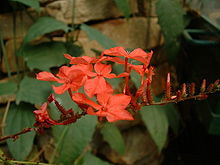Plumbago indica
Appearance
| Plumbago indica | |
|---|---|

| |
| Scientific classification | |
| Kingdom: | Plantae |
| Clade: | Tracheophytes |
| Clade: | Angiosperms |
| Clade: | Eudicots |
| Order: | Caryophyllales |
| Family: | Plumbaginaceae |
| Genus: | Plumbago |
| Species: | P. indica
|
| Binomial name | |
| Plumbago indica L. (1754)
| |
| Synonyms[1] | |
| |
Plumbago indica, the Indian leadwort, scarlet leadwort or whorled plantain, is a species of flowering plant in the family Plumbaginaceae, native to Southeast Asia, Indonesia, the Philippines, and Yunnan in southern China.
Growing to 2 m (7 ft) tall by 1 m (3 ft) wide, it is a spreading evergreen shrub with oval leaves. It produces racemes of deep pink or scarlet flowers in winter.[2]
Plumbago indica is cultivated as an ornamental plant. With a minimum temperature of 7 °C (45 °F), it prefers subtropical or warm-temperate climates, or a greenhouse in cool climates.[3]
It has gained the Royal Horticultural Society's Award of Garden Merit.[4][5]
References
[edit]- ^ Plumbago indica L. Plants of the World Online. Retrieved 1 May 2024.
- ^ Christopher D. Brickell (2008). RHS A-Z encyclopedia of garden plants. United Kingdom: Dorling Kindersley. p. 1136. ISBN 978-1405332965.
- ^ Nico Vermeulen (2004-08-31). The Complete Encyclopedia Of Container Plants: Detailed Descriptions of Hundreds of Species. Rebo Publishers. p. 216. ISBN 978-90-366-1584-6.
- ^ "RHS Plant Selector - Plumbago indica". Retrieved 15 April 2020.
- ^ "AGM Plants - Ornamental" (PDF). Royal Horticultural Society. July 2017. p. 80. Retrieved 7 May 2018.
Wikimedia Commons has media related to Plumbago indica.
